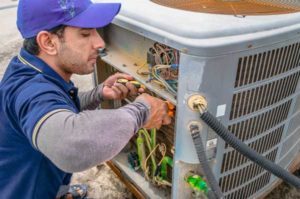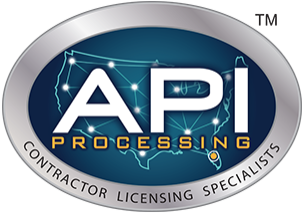Do you need a Contractor License in Texas?
Texas only regulates HVAC and Electrical Licensing at the state level. Are you interested in obtaining a contractor’s license in the State of Texas for an existing company? Do you need help with Texas application processing?
 How to get Texas Electrical or HVAC Contractor License
How to get Texas Electrical or HVAC Contractor License
API offers contractor licensing application assistance in Burglar Alarm, Electrical, and Construction license classifications. API has been working in the Electrical and Construction Licensing Industry since 2002, and has the knowledge, resources, and expertise to help get you licensed in the state of Texas.
What are the requirements for a Texas Electrical Contractors License?
This is a two-part process, first you need to obtain a Master Electrician License, then apply for the Electrical Contractor License.
- You Must have held a Journeyman Electrical License
- You must be able to show that you have completed 12,000 of on-the-job training under supervision of a Master Electrician licensed in the state of Texas. You will need to contact and obtain verification from each Master Electrician that supervised you.
- You must take the licensing exam after you complete and get your application verified
- You must complete a Criminal History Questionnaire if previously convicted of felony or misdemeanor (other than traffic violation)
- Additional documentation may be required.
What are the requirements for a Texas HVAC Contractors License?
The Air Conditioning and Refrigeration program regulates contractors who install, repair, or maintain systems related to air conditioning, refrigeration, or heating.
Experience Requirements
To be eligible for licensure, you must meet one of the following experience requirements:
- You have at least 48 months of practical experience in air-conditioning and refrigeration-related work under the supervision of a licensed air conditioning and refrigeration contractor in the past 72 months, OR
- You have held a technician certification for the past 12 months and you have at least 36 months of practical experience in air-conditioning and refrigeration-related work under the supervision of a licensed air conditioning and refrigeration contractor in the past 48 months
All experience must be documented on an Experience Verification Form (PDF), which must be completed by the person or persons who supervised your experience. Do NOT complete this form yourself. Use multiple forms, if necessary.
The completed experience verification form(s) should be submitted with your application materials.
License Classes
- The Class A license allows you to work on any size unit.
- The Class B license allows you to work on cooling systems of 25 tons and under, and heating systems of 1.5 million BTUs/hour and under.
Exam Requirement
- After submitting your application and proof of qualifications, TDLR will approve your eligibility to take the licensing exam. Please see the examination requirements page for further information.
- You must complete all requirements of the application process, including passing the licensing exam, within one year of the date the application is filed.
Insurance Requirement
- After passing the licensing exam, you must submit a Certificate of Insurance, which includes the license holder name and business name to the Department. You may submit the documents to customer service by email.
- You must maintain commercial general liability insurance at all times while your license is active. Insurance must be obtained from an insurance provider authorized to sell liability insurance in Texas
API can Help and Handle the Entire Application Process!
Our staff will simplify the entire licensing process and is dedicated to helping Contractors obtain their State License.
Unlike our competitors, API manages the entire Application Process from start to finish. We oversee your application until it is approved and can save you time and money.
API has been working with State Contractors since 2002 and have the knowledge and resources to deal with issues and special circumstances that could stall the licensing process.
Drop us a line today for a free quote! We can assist you with the following services:
- Determine License Eligibility
- Applications for State Contractors License
- Applications for a Company Business License
- Designated Resident Qualifying Agent
- Out-of-state Licensing
- Provide Listed Qualified Agents
- Statement of Ownership
- Consult and Educate Clients on Licensing Laws
- Prepare & process Exam Applications & Registration
- Exam Support
- Initial Certification
- License Renewals
- Reciprocity
- Provide Qualifier Placement
- Bonding, Insurance and Surety Bonds
- Form corporations, LLC’s, Partnerships, Corporations
- Certificate of assumed name
Common Problems to Avoid When Filing Your Texas Contractor License on Your Own
When filing for your Texas contractor license independently, it’s important to be aware of common problems that could lead to delays or even denial of your application. These issues often include incomplete or inaccurate documentation, not meeting specific educational and experience requirements, and misunderstanding or overlooking state and local regulations. Additionally, inadequate preparation for required exams and underestimating the time needed to navigate the bureaucratic process can cause significant setbacks. To avoid these pitfalls, ensure your application is thorough, accurate, and compliant with all Texas Department of Licensing and Regulation (TDLR) guidelines.
Here are the most common problems:
1. Complex Application Requirements
Obtaining a contractor license in Texas involves a detailed process that requires specific documentation, such as proof of qualifications, insurance, and financial stability. It is crucial to ensure every part of the application is complete and accurate. Missing or incorrect information can lead to unnecessary delays or even a denial of your application.
2. Stringent Educational and Experience Requirements
Each type of contractor license in Texas comes with its own set of prerequisites related to education and professional experience. Meeting these criteria can be challenging, as applicants must demonstrate their qualifications and ensure they meet the exact requirements specified for the license type they are applying for.
3. Navigating State and Local Regulations
Understanding and complying with both state and local regulations in Texas can be confusing, particularly for contractors who plan to work across multiple jurisdictions. Regulations can vary significantly between cities and counties, making compliance more complex for those who need to meet multiple sets of rules.
4. Examination Preparation
Many contractor licenses in Texas require passing one or more examinations that test knowledge and practical skills in specific trades. These exams are rigorous and comprehensive, requiring thorough preparation to ensure success. Failure to prepare adequately can result in failing the exams, which can delay the licensing process.
5. Delays and Bureaucratic Hurdles
The licensing process in Texas can be slow, with unexpected delays often arising, especially when applications are incomplete or contain errors. Navigating the bureaucratic aspects of the process—such as understanding timelines, submission requirements, and necessary documentation—can be a significant challenge, potentially leading to further setbacks.
By ensuring that your application is comprehensive, accurate, and aligned with all TDLR guidelines, and by preparing thoroughly for any required exams, you can help avoid these common problems and move smoothly through the Texas contractor licensing process.
Texas Contractor Licensing Terms You Need to Know
Navigating the Texas contractor licensing process can be challenging, especially with the specific requirements and regulations that must be followed. Whether you're a new contractor or looking to expand your business in Texas, understanding the key terms and procedures is crucial for a smooth licensing experience. To help you get started, here are some common terms related to Texas contractor licensing and how API Processing can assist you in successfully obtaining and maintaining your license.
- Texas Department of Licensing and Regulation (TDLR) . The TDLR is the state agency responsible for overseeing the licensing and regulation of contractors in Texas. It sets the requirements and standards for obtaining and maintaining a contractor license.
- License Classification. This refers to the specific type of contractor license based on the nature of work you intend to perform. Common classifications in Texas include residential contractor, electrical contractor, plumbing contractor, and HVAC contractor, each with its own set of qualifications and requirements.
- Qualifying Individual. The qualifying individual is the person who meets the experience and examination requirements for the contractor license. This person is typically the owner, partner, or a key employee of the contracting business who ensures compliance with state regulations.
- Continuing Education. Continuing education refers to the ongoing learning required to maintain a contractor license in Texas. License holders must complete a certain number of continuing education hours every year to stay current with industry standards and state regulations.
- Journeyman License. A journeyman license is a type of license for contractors who have completed the necessary training and experience in their specific trade, such as plumbing or electrical work, but are not yet qualified to be a master or independent contractor.
- Master License. A master license is a higher-level license that allows contractors to operate independently, supervise other licensed professionals, and pull permits for projects. To obtain a master license, contractors must have extensive experience and pass a comprehensive exam.
- Surety Bond. A surety bond is a financial guarantee required for most contractor licenses in Texas. It protects consumers by ensuring that the contractor will fulfill their obligations and comply with state regulations. If the contractor fails to meet these requirements, the bond can provide compensation to the client.
- Liability Insurance. Liability insurance is required for all licensed contractors in Texas to protect against claims of property damage or personal injury that might occur during a project. It ensures that contractors can cover any potential liabilities, safeguarding both their business and their clients.
- Business Structure. This term refers to the legal structure of a contracting business, such as a sole proprietorship, partnership, corporation, or limited liability company (LLC). The chosen structure can affect licensing requirements, taxes, and liability.
- License Renewal. Contractor licenses in Texas must be renewed periodically, typically every one or two years, depending on the license type. The renewal process requires submission of a renewal application, proof of continuing education, and payment of a renewal fee.
How API Processing Can Help
API Processing is here to assist you through every step of the Texas contractor licensing process. Our team of experts will help you understand the specific requirements for your license classification, guide you through verifying your experience and education, and ensure that your application is complete and accurate. We provide resources for continuing education and exam preparation, helping you stay compliant with state regulations. By partnering with API Processing, you can focus on building your business while we handle the complexities of licensing, making the process smooth and hassle-free.
